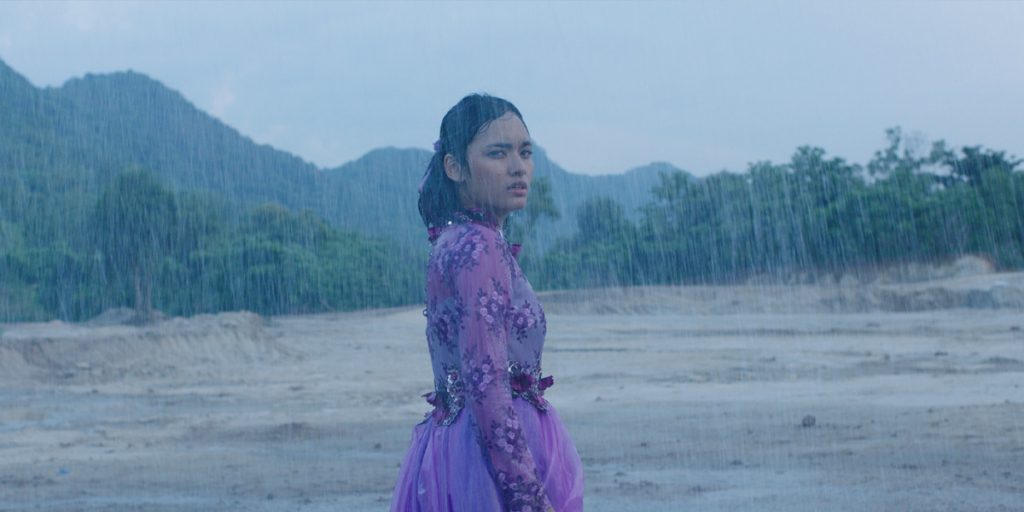Shining a fierce light on the societal issue of arranged marriage, Yuni is an affecting, meticulously crafted drama from a director in full control of her craft.
Director and co-writer Kamila Andini (The Mirror Never Lies, The Seen and the Unseen) and her crew imbue the world of Yuni with the colour purple. The titular main character, an Indonesian teenager with dreams of going to university, drives a purple scooter, wears purple clothes and jewellery, and her bedroom is adorned with different shades of the colour; even the world around her carries purple tones, her unique personality spreading and populating outwards. Purple here is the colour of rebellion and freedom, and its consistent but subtle usage emphasises the notion that Yuni’s fight for control of her life is existent but by no means easy. Drawing on real stories from her home country of Indonesia, Andini exposes the very important issue of arranged marriage whilst also touching on other themes such as gender fluidity, always doing so with a great intelligence and empathy. Yuni finds moments of levity in its darkest moments, the colour purple always poking through to hint at a brighter future based around freedom for teenage girls in Indonesia.
Yuni and her friends are your typical teenagers: gossip-ready, hormones slowly growing, bored of school, all with dreams of leaving their hometown for the wider world. Yet Andini quickly situates these youngsters in a wholly more challenging world, with the proposal of an arranged marriage hanging over the head of Yuni within the first 15 minutes. She rejects the first man, does the same to second, and is then faced with the myth – believable to her, her family and society – that she will never marry if she rejects a third proposal. This clash of teenage and adult worries is handled impressively by Andini; at one point, Yuni lies in a field with four friends, the conversation shifting from the usual curious teenage questions about sex to more adult subjects like marriage in the blink of an eye. It’s uncomfortable and stark, highlighting the premature growing up that these girls are having to go through, however unwillingly.
Similarly, Yuni’s screenplay is an impactful mix of joyously childish one-liners – one friend is more interested in “snacking, not dating!” – and hard-hitting lines about the girls’ fears of incoming marriage. Andini and her co-writer Prima Rusdi handle proceedings with care, deftly shifting between light and heavy tones. This considered approach translates further into the camerawork and set design. As one of the teenagers cries in her bedroom surrounded by Yuni and friends, DOP Teoh Gay Hian carefully tracks around the girls’ faces and surroundings, the quiet cries the only sound in what stands out as one of the most poignant scenes of the film. The camera captures teddy bears, a pink duvet and a T-shirt reading ‘Girl Power’, before eventually settling on a sparkling, tacky sign on the bedroom wall featuring just one word: LOVE. It’s such a carefully shot and intricately composed scene, capturing a striking contrast between teenage innocence and a very serious issue.

As the titular character, Arawinda Kirana gives a superb performance, ranging from chatty, sulky teenager to mature adult at ease. She carries Yuni with a near-silent but unwavering power, the energy of the central character seeping into the scenes as much as the colour purple. Kirana also finds time to release her emotions; a standout moment sees a close-up of Yuni watching a friend being married off, her eyes filling with tears as she performs a ceremonial dance. Dialogue free, this scene is all about the intensity of Kirana’s eyes. From the first to the last scene, she captivates in her first leading role.
Yuni is composed of so many intricate sequences like this, yet Andini never allows it to become a procession of standalone moments of power. Her ability to draw everything into a cohesive, satisfying and utterly unnerving drama is hugely impressive. Yuni falters at certain points – its slow burn atmosphere can sometimes cause the emotional arc of the narrative to become momentarily lost – but the steady tone of power and liberation always comes back strong. Inspired by a famous Indonesian poem about rain falling in the wrong season, Yuni consistently marks the titular character out as a teenager forcing to mature and blossom far too early. Dreams of boys and universities are stifled by the harsh realities of men and marriage, and it’s this constant battle between childhood and adulthood that carries serious weight right up to Yuni’s haunting conclusion.
Yuni had its UK Premiere at the 2022 Glasgow Film Festival on 4 March, 2022, and will be screened again in-person and virtually on 5-8 March.

